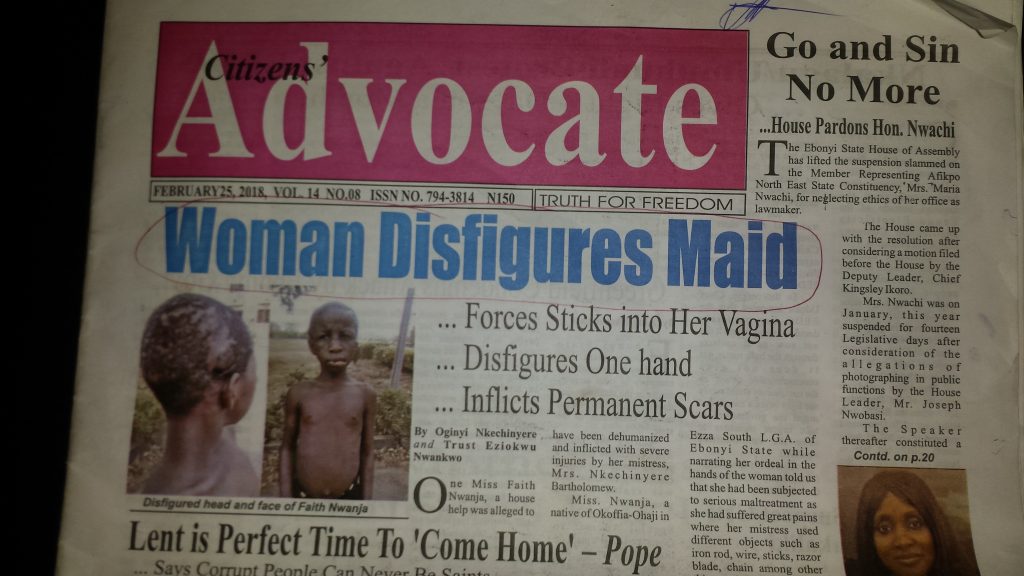Recently a story about a 4-year-old girl, Uloma, made a headline in a regional newspaper, Citizens’ Advocate. Uloma was found in a slave-like manner under the watch of a certain woman, Mrs Nwali Josephine. The woman is not the little girl’s mother. Weeks before Uloma was discovered, she hawked for her ‘madam’, Mrs Nwali, with little care and feed. Her suffering was terrible such that when the Ministry of Women Affairs and Social Development found her, she was ill and had pultruding stomach indicating poor care and feeding.
You might be wondering how Uloma ended up with Mrs Nwali? Well, her mother, Veronica Igwe traded with Mrs Nwali at a rice-mill and could not pay up a balance of N 100. Uloma was then exchanged in place of the debt pending when her mother could pay. Now in the police custody over alleged child trafficking, Mrs Nwali and Mrs Igwe are wondering why anyone should frown at their actions. Was Uloma not freely given by her mother, and didn’t Mrs Nwali promise to return the child whenever she gets her pay back?
It is not difficult to see the error in the above reasoning. While the two adults engage each other in a contractual agreement, the involvement of the child problematizes their action. Child rights is a fundamental issue worldwide, and both Nigeria’s laws and international instruments have special provision for child rights protection. Often times however, interest of the child is rarely or never factored whenever adults take decisions that involve a child as it happened in Uloma’s case. The fact that children everywhere are generally dependent heightens their vulnerability. It is precisely for this reason however, that the UN Conventions on the Rights of the Child (CRC) {28/11/1989} sets out principles to mainstream child interest, such that in all nations of the world, for every act which may impact on a child, the interest of that child takes precedence. The African Charter on the Rights and Welfare of the Child, adopted at the General Assembly of AU in 1990 also prioritises child’s interest, insisting the child has the right to grow up in the family environment free from violence, fear and torture.
To step it down, beyond the provisions of the Nigeria’s Constitution in Chapter IV which sets out fundamental rights, and which in principle, are extensive to children, recent effort to give special consideration to the spate of child rights violation in Nigeria has seen the UN’s CRC domesticated as Child Rights Acts in 2003. Many states have keyed into the federal Act by enacting laws to that effect including Lagos, Ebonyi (in 2010), Enugu (in 2016) and 21 others (living 12 more states behind).
Despite this effort however, more Nigerian child are exposed to violence and abuse ranging from physical to psychological and sexual. The fact that recent survey (2014) by the National Population Commission (supported by UNICEF and the US Centres for Disease Control and Prevention) indicates that 6 out of 10 children experience at least one form of violence before their 18th birthday should make us all to shudder and awaken in us a sense of urgency to campaign aggressively against child rights violations in our society. Nelson Mandela made a remark that has import for this call. He once said:
“Safety and security don’t just happen, they are the result of collective consensus and public investment. We owe our CHILDREN the most vulnerable citizens in any society – a life FREE from VIOLENCE and FEAR”. It is up to you and us to ensure we don’t have more Uloma situations in our communities.
When it comes to human rights, we must not forget that existence of a law giving express protection to them is not the only ground to ensure their respect. This point has been made in a Journal of Jurisprudence (2010), vol. 1, by Gumbis, J. et al. who argues that “the fact that a person has rights has nothing to do with enacting these rights in legal document”. It is rather embedded in the natural principle upholding human dignity. Thus, legal lacuna can never justify actions negating human dignity in any clime.
Shalom!
Contributors: C. O. Ikegbunam Esq.
C. A. Nwankwo Esq.
D. A. Okoliko
Disclaimer:
This is a free educational material and not a source of legal advice. If you need any, please consult your lawyer.


Leave a Reply